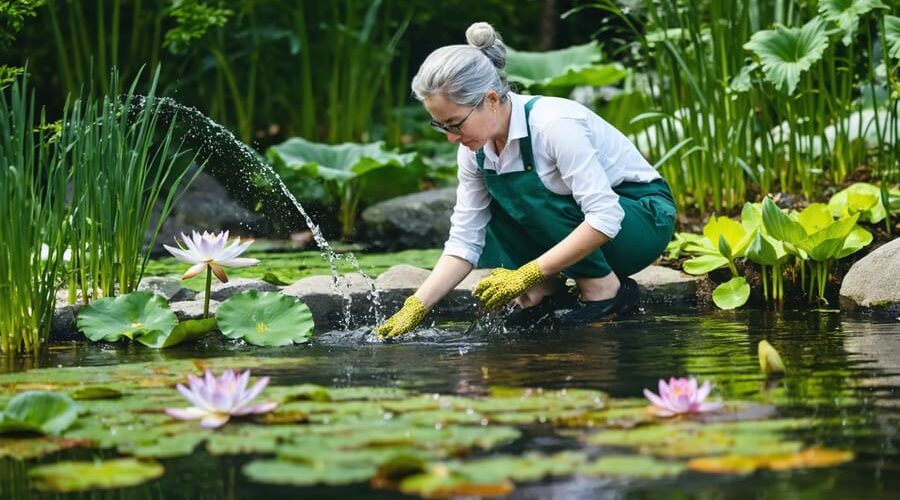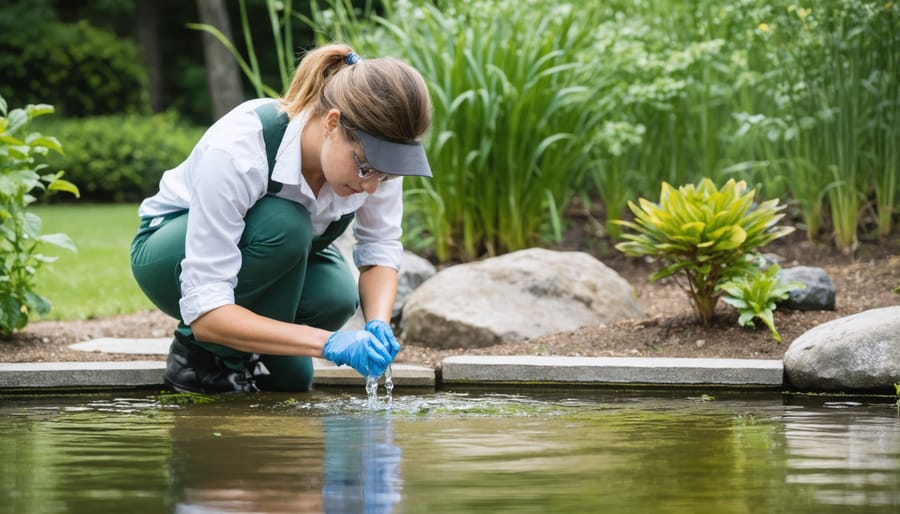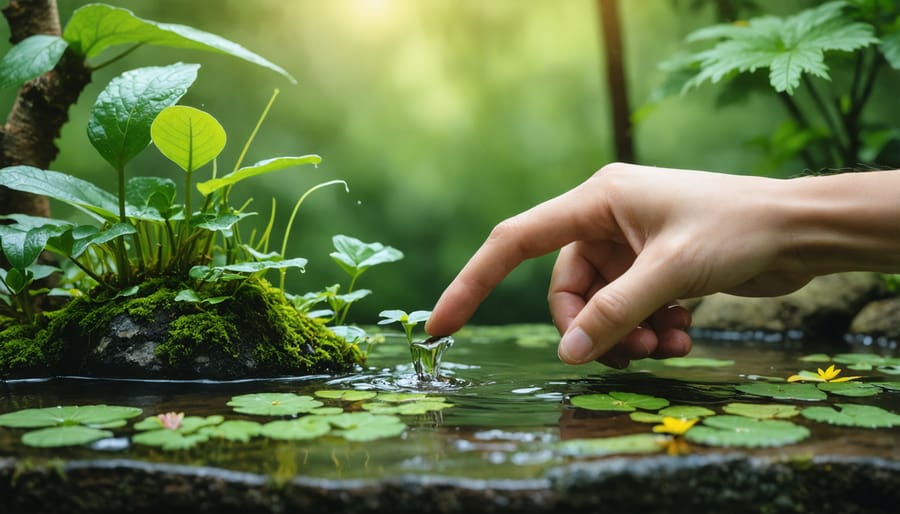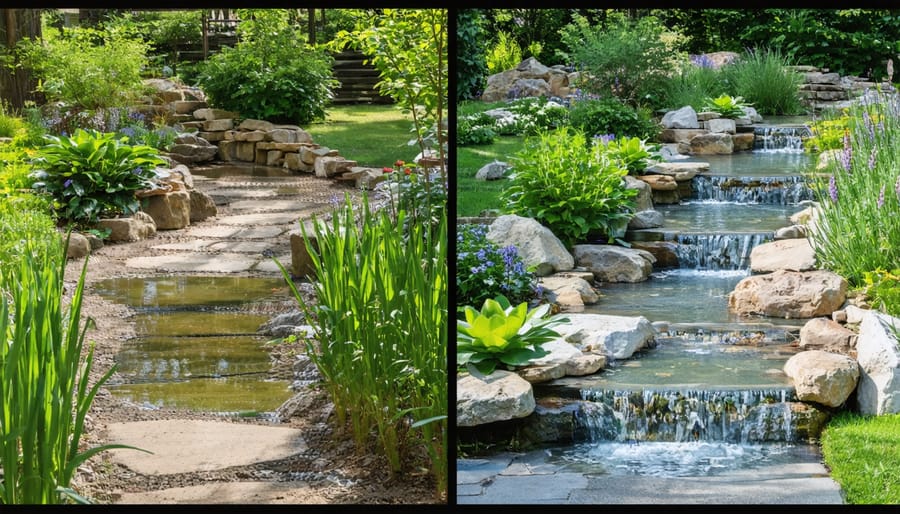
Make a Splash: How Master Gardeners Transform Water Gardens
Volunteer Master Gardeners transform communities through expert horticultural knowledge and dedicated service, bringing decades of gardening wisdom to public spaces and private gardens alike. These certified green-thumbed enthusiasts complete rigorous training through cooperative extension programs, mastering everything from soil science to sustainable landscaping practices, before sharing their expertise with fellow gardening enthusiasts.
Working alongside university experts and agricultural professionals, Master Gardeners contribute thousands of volunteer hours annually, offering free guidance at community gardens, farmers’ markets, and educational workshops. Their passion for plants extends beyond traditional gardening, encompassing water features, native species conservation, and ecological sustainability practices that benefit both local ecosystems and home gardens.
Whether you’re an experienced gardener looking to give back or a newcomer seeking trusted gardening advice, the Master Gardener program offers a unique blend of learning and service. These dedicated volunteers don’t just maintain gardens – they cultivate knowledge, inspire sustainable practices, and nurture the next generation of gardening enthusiasts through hands-on education and community outreach programs.
The impact of Master Gardeners ripples through neighborhoods, transforming empty lots into vibrant community spaces and helping homeowners create thriving, sustainable landscapes that benefit both people and the environment.
What Makes a Water Garden Master Gardener Special?
Required Training and Certification
Becoming a volunteer master gardener with a focus on aquatic plants requires specialized training and certification. The journey begins with a comprehensive foundation course covering general horticulture principles, followed by specific modules dedicated to water gardening. These courses typically combine classroom learning with hands-on experience, allowing you to develop expert water gardening skills under experienced mentors.
Most programs require 40-50 hours of initial training, with about 15 hours specifically focused on aquatic plant management and water feature maintenance. Topics include water chemistry basics, pond ecosystem balance, floating and submerged plant care, and sustainable water gardening practices. You’ll learn about native aquatic species, invasive plant identification, and proper plant selection for different water features.
To maintain certification, volunteers typically need to complete 20 hours of continuing education annually and contribute 40 hours of community service. Many programs offer specialized workshops throughout the year, covering seasonal topics like winter pond preparation and spring revival techniques. This ongoing education ensures master gardeners stay current with the latest sustainable water gardening practices and can effectively share their knowledge with the community.
Essential Water Garden Knowledge
Master gardeners specializing in water features must develop expertise in three crucial areas: water chemistry, aquatic ecosystems, and plant selection. Understanding water chemistry involves monitoring pH levels, managing algae growth, and maintaining proper nutrient balance for healthy aquatic life. Regular testing and adjustments ensure optimal conditions for both plants and fish.
Creating balanced aquatic ecosystems requires knowledge of the relationship between plants, fish, and beneficial microorganisms. Master gardeners learn to establish and maintain these delicate systems, ensuring proper filtration and oxygenation while controlling unwanted pests and diseases.
Plant selection is another vital skill, combining both aesthetic and practical considerations. Water gardeners must understand which plants thrive in different zones – underwater, floating, marginal, and bog areas. They learn to choose plants that not only look beautiful but also contribute to water quality and provide shelter for aquatic life.
Success in water gardening comes from hands-on experience and continuous learning. Master gardeners often start with small projects and gradually tackle more complex water features as their expertise grows. They share this knowledge with others, helping create sustainable and beautiful water gardens in their communities.

The Mentorship Program Structure
One-on-One Guidance
One of the most rewarding aspects of being a master gardener is providing personalized guidance to fellow gardening enthusiasts. Through one-on-one mentoring sessions, master gardeners share their expertise and help mentees overcome specific challenges in their gardens.
These individualized sessions typically begin with a thorough assessment of the mentee’s garden space, growing conditions, and personal goals. Master gardeners take time to understand not just the physical aspects of the garden but also the gardener’s experience level, time commitment, and vision for their space.
During these meetings, master gardeners offer tailored advice on plant selection, soil preparation, proper watering techniques, and pest management strategies. They might demonstrate specific techniques, such as proper pruning methods or companion planting arrangements, ensuring their mentees understand the practical application of gardening principles.
Follow-up support is a crucial component of this mentorship. Master gardeners often schedule regular check-ins to monitor progress, answer questions that arise during the growing season, and help troubleshoot any issues. They might exchange photos, conduct video calls, or arrange additional site visits to provide ongoing guidance.
This personalized approach helps build confidence in new gardeners while ensuring they develop sustainable gardening practices. The relationship often evolves into a collaborative learning experience, with mentees sharing their successes and challenges, contributing to the master gardener’s own growth and understanding.
Hands-on Learning Sessions
As part of the Master Gardener program, participants engage in extensive hands-on training through a variety of practical workshops and field sessions. These immersive learning experiences typically include soil testing demonstrations, plant identification walks, pruning workshops, and specialized water garden maintenance tutorials.
Each session is carefully structured to provide real-world experience under the guidance of experienced mentors. Trainees learn by doing – getting their hands dirty while mastering essential techniques like proper planting depths for aquatic plants, water quality testing, and sustainable pest management practices.
The practical sessions often take place in community gardens, public spaces, and demonstration gardens where volunteers can work with different water features and plant varieties. Participants practice installing pond liners, setting up filtration systems, and maintaining proper water chemistry while receiving immediate feedback from instructors.
These workshops also incorporate seasonal activities, allowing volunteers to experience the full cycle of garden maintenance throughout the year. From spring pond preparation to winter protection techniques, each session builds upon previous knowledge while introducing new skills.
What makes these training sessions particularly valuable is the collaborative learning environment. Volunteers work in small groups, sharing experiences and learning from each other’s successes and challenges. This hands-on approach ensures that theoretical knowledge transforms into practical expertise that can be confidently applied in real-world situations.

Progress Tracking and Support
Tracking progress as a volunteer master gardener is essential for both personal growth and supporting mentees effectively. Most programs use a combination of methods to monitor development and provide ongoing support throughout the learning journey.
Mentees typically maintain detailed gardening journals documenting their activities, challenges, and successes. These journals serve as valuable learning tools and help mentors identify areas needing additional guidance. Regular check-ins, usually monthly, allow mentors to review progress, answer questions, and adjust teaching approaches as needed.
Many programs implement a milestone system where mentees work toward specific achievements in areas like plant identification, soil management, and water garden maintenance. This structured approach helps track skill development while keeping motivation high. Digital platforms and mobile apps are increasingly used to log volunteer hours, share progress photos, and connect with other program participants.
Support extends beyond formal tracking methods. Experienced master gardeners often create informal mentoring circles, where participants can share experiences and learn from each other. Regular group workshops and seasonal demonstrations provide hands-on learning opportunities and strengthen the community aspect of the program.
Remember that progress isn’t just about checking boxes – it’s about building confidence and expertise over time. Successful programs maintain flexibility in their tracking methods, recognizing that each gardener’s journey is unique and may require different types of support along the way.
Real Success Stories
Community Garden Transformations
Master gardeners across the country have been instrumental in transforming neglected public spaces into thriving aquatic sanctuaries. Through various community water garden projects, these dedicated volunteers have created beautiful and educational spaces that benefit entire neighborhoods.
In Portland, Oregon, a team of master gardeners converted an unused courtyard at a local elementary school into a vibrant pond garden. The project now serves as an outdoor classroom where students learn about aquatic ecosystems, native plants, and water conservation. The garden features a small pond with local water lilies, marsh marigolds, and provides a habitat for beneficial insects and amphibians.
Another inspiring transformation took place in Atlanta, Georgia, where master gardeners helped design and implement a water-wise demonstration garden at a community center. The project showcases rain gardens, bog plantings, and a recycling water feature that teaches visitors about sustainable water management practices.
In Minnesota, master gardeners partnered with a senior living facility to create an accessible water garden with raised beds and seating areas. The therapeutic garden includes gentle water sounds, sensory plants, and wheelchair-friendly paths, providing residents with a peaceful outdoor space for relaxation and gentle gardening activities.
These projects demonstrate how master gardeners combine their expertise in water gardening with community service to create lasting, beautiful spaces that educate and inspire others while promoting environmental stewardship.

Private Garden Achievements
Through dedicated mentorship, volunteer master gardeners have helped countless individuals transform their private gardens into thriving ecosystems. Take Sarah from Minnesota, who struggled with a shaded backyard pond until her master gardener mentor suggested native water lilies and marginal plants that now create a stunning display even in low-light conditions.
Another success story comes from Mike in Arizona, who learned sustainable water management techniques from his mentor. By implementing proper filtration and incorporating drought-resistant plants around his pond, he reduced water consumption by 40% while maintaining a healthy aquatic environment.
The Rodriguez family transformed their small urban backyard into a certified wildlife habitat under the guidance of their master gardener. Their pond now serves as a gathering spot for local birds and beneficial insects, creating an educational opportunity for their children and neighbors.
In Florida, retired teacher Linda credits her mentor for helping her create a low-maintenance water garden that accommodates her limited mobility. Through smart design choices and proper plant selection, she now manages her garden independently while enjoying its therapeutic benefits.
These success stories highlight how master gardeners don’t just share knowledge – they help create sustainable, personalized outdoor spaces that bring joy and purpose to their mentees’ lives. Their guidance often extends beyond basic gardening, encompassing ecosystem development, wildlife conservation, and sustainable water management practices.
Becoming a Volunteer Master Gardener
Application Process
Becoming a volunteer master gardener starts with contacting your local cooperative extension office. Most programs begin accepting applications in late fall or early winter for classes that start the following spring. You’ll need to complete an application form detailing your gardening experience and explaining why you want to join the program.
The selection process typically includes an interview where program coordinators assess your commitment to community service and willingness to learn. Once accepted, you’ll begin an intensive training program that usually runs for 12-16 weeks. Classes are often held during weekdays, so flexibility in your schedule is important.
During training, you’ll need to maintain a minimum grade average (usually 70-80%) on quizzes and exams. You’ll also complete hands-on projects and practice sessions in demonstration gardens. After graduation, most programs require 40-50 volunteer hours in your first year, along with additional continuing education credits to maintain your certification.
The application process is competitive, so highlight any relevant experience and your enthusiasm for sharing knowledge with others. Many programs also require a background check and a modest program fee to cover training materials.
Commitment and Benefits
Becoming a volunteer master gardener requires a significant time commitment, but the rewards make it well worth the effort. Most programs require 40-50 hours of initial training, typically spread across several weeks. Classes cover essential topics like soil science, plant diseases, sustainable gardening practices, and water management. After completing the coursework, volunteers commit to providing 40-50 hours of community service annually to maintain their certification.
The benefits of becoming a master gardener are numerous. You’ll gain extensive knowledge about gardening and landscaping while connecting with like-minded enthusiasts in your community. The program provides access to expert instructors, research-based resources, and continuing education opportunities. Many volunteers find satisfaction in sharing their knowledge with others through community projects, educational workshops, and gardening helplines.
Additional perks often include exclusive access to gardening events, field trips to botanical gardens, and discounts at local nurseries. Perhaps most rewarding is the opportunity to make a positive impact in your community while pursuing your passion for gardening.
Volunteer master gardeners play a vital role in cultivating greener, more sustainable communities through their dedication to education and environmental stewardship. Their impact extends far beyond individual gardens, creating ripple effects that benefit entire neighborhoods and ecosystems. These knowledgeable volunteers help preserve native plant species, promote sustainable gardening practices, and share valuable expertise with countless community members.
The value of master gardeners can be measured not just in the plants they nurture, but in the relationships they build and the knowledge they pass on to future generations. Through their volunteer work at community gardens, schools, and public spaces, they inspire others to embrace gardening while making our communities more beautiful and environmentally conscious.
If you’re passionate about gardening and eager to make a difference, becoming a master gardener could be your calling. The program offers an incredible opportunity to deepen your horticultural knowledge while giving back to your community. Whether you’re a seasoned gardener or just beginning your journey, the master gardener program welcomes dedicated individuals who share a love for plants and teaching.
Consider taking the first step toward joining this rewarding community of volunteers. Your expertise and enthusiasm could help shape the future of sustainable gardening in your area while creating lasting connections with fellow garden enthusiasts. The seeds you plant today as a master gardener will grow into a legacy of knowledge and environmental stewardship for years to come.
